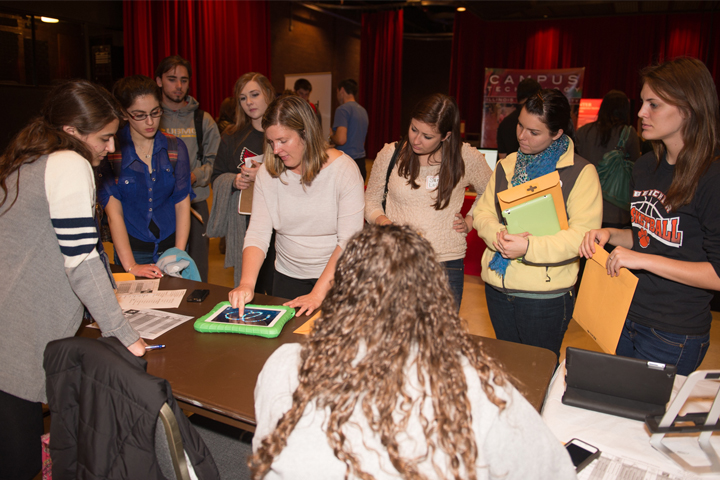“It was really cool.” –Jack Pennoyer, senior special education major.
“I would recommend it for all education majors.” –Amy Wieting, sophomore middle level education major.
“It gave me a lot of ideas.” –Sarah Moskal, senior biology education major.
“I will definitely come back as a practicing teacher.” –Emily Tremors, senior Spanish education and French major.
“Come to this conference!” –Maggie Hanson, senior physics education major.
These are just a few of the comments from education majors who attended the fourth annual Teaching in the 21st Century Conference (T21Con) at the Bone Student Center on November 5. T21Con is a hands-on, engaging learning opportunity for current and aspiring educators to gain experience with technology in the classroom.
It is funded by career educators and alumni Mary F. English ’68 and Robert J. English ’66, M.B.A. ’67 and organized by the College of Education and the Student Council for Exceptional Children (SCEC). This year attendance topped 400, up from 300 in 2012.
The daylong event began with keynote David Jakes, digital learning strategist for the Third Teacher + by Cannon Design in Chicago. His presentation “Learning at the Speed of Technology” offered an eye-opening look into the fast-occurring changes to the way students learn using different technologies and how teachers must adapt.
Jakes discussed how the first technology education majors encountered was floppy disks, while young kids today are growing up with iPads from birth.
“He really put into perspective the way technology is really taking over our lives,” said Christina Mora, a junior special education major. “It’s kind of scary yet really exciting at the same time to see where it goes from here.”
The conference also included an array of learning sessions, from an in-depth reflection of a private school’s 1:1 iPad initiative, to ideas for creating a completely paperless

Students and teachers from Thomas Metcalf School demonstrate authentic learning sessions with an array of different technologies in the Circus Room, BSC.
classroom, to demonstrations of learning environments with Google tools by 4th-8th grade students from Thomas Metcalf, one of two University Laboratory Schools.
Moskal said she was appreciative of the conference’s diverse offerings. She attended “Digital Storytelling: Get It Write!” by Joe Brennan, an instructional media expert at Wilkes University in Wilkes-Barre, Pennsylvania.
“I am a visual learner, and I think that it is important to incorporate that into the classroom,” Moskal said. “He pointed out a lot of important movie-making techniques that I never realized were being used to improve the story. I thought that was really cool.” Moskal said the presentation sparked a multitude of ideas for incorporating the visual strategies into her content area, biology science.
Another major draw for the conference was the vendor hall. Here, companies such as Microsoft, Apple, Haddock, Primer Literacy, and several assistive technology developers were on-hand to discuss and demonstrate gadgets and displays for attendees.
“I really appreciated learning about Haddock’s interactive projector,” Wieting said. “I know a lot of schools are cutting back on funding, but this was a much cheaper way to incorporate technology similar to the Smartboard, which I think is a great tool.”
“This was a great place to come to find out about new technology and to see assistive technology in action,” Pennoyer said. The special education major also stopped by to check out the College of Education’s 3-D printer, one of the many high-tech gadgets available to education majors in the Exploratorium (DeGarmo 308).
As is customary at T21Con, prize drawings took place at the end of the conference, and included high-tech devices such as an Xbox 360 and an iPad. More importantly, attendees were left with inspiration for how they can do more to engage students in the classroom!
T21Con wants you! Don’t forget to check back next fall for 2014 conference details. And don’t miss the third installment of the T21 Speaker Series this spring, where attendees learn from leading experts in the field.

